2014 年 12 月英语六级真题试卷(第 2 套)
Part I Writing (30 minutes)
Directions:Forthispart,youareallowed30minutestowriteanessaybasedonthe
picture below. You should start your essay with a brief description of
thepictureandthendiscusswhatqualitiesanemployershouldlookfor
injobapplicants.Youshouldgivesoundargumentstosupportyourviews
and write at least 150words but no more than 200words.
Listening
(30 minutes)
Comprehension
Part II
Section A
Directions:In this section, you will hear 8 short conversations and 2 long
conversations.Attheendofeachconversation,oneormorequestionswill
beaskedaboutwhatwassaid.Boththeconversationandthequestionswill
be spoken only once. After each question there will be a pause. During
the pause, you must read the four choices marked A), B), C) and D), and
decide which is the best answer. Then mark the corresponding letter on
Answer Sheet 1 with a single line through the centre.
注意:此部分试题请在答题卡 1 上作答。
1. A) The man’s tennis racket is good enough.
B) The man should get a pair of new shoes.
C) She can wait for the man for a little while.
D) Physical exercise helps her stay in shape.
2. A) The woman will skip Dr. Smith’s lecture to help the man.
B) Kathy is very pleased to attend the lecture by Dr. Smith.
C) The woman is good at doing lab demonstrations.
�
D) The man will do all he can do assist the woman.
3. A) The woman asked the man to accompany her to the party.
B) Steve became rich soon after graduation from college.
C) Steve invited his classmates to visit his big cottage.
D) The speakers and Steve used to be classmates.
4. A) In a bus.
B) In a clinic.
C) In a boat.
D) In a plane.
5. A) 10:10.
B) 9:50.
C) 9:40.
D) 9:10.
6. A) She does not like John at all.
B) John has got many admirers.
C) She does not think John is handsome.
D) John has just got a bachelor’s degree.
7. A) He has been bumping along for hours.
B) He has got a sharp pain in the neck.
C) He is involved in a serious accident.
D) He is trapped in a terrible traffic jam.
8. A) She is good at repairing things.
B) She is a professional mechanic.
C) She should improve her physical condition.
D) She cannot go without a washing machine.
Questions 9 to 11 are based on the conversation you have just heard.
9. A) Some witnesses failed to appear in court.
B) The case caused debate among the public.
C) The accused was found guilty of stealing.
D) The accused refused to plead guilty in court.
10. A) He was out of his mind.
B) He was unemployed.
C) His wife deserted him.
D) His children were sick.
11. A) He had been in jail before.
�
B) He was unworthy of sympathy.
C) He was unlikely to get employed.
D) He had committed the same sort of crime.
Questions 12 to 15 are based on the conversation you have just heard.
12. A) Irresponsible.
B) Unsatisfactory.
C) Aggressive.
D) Conservative.
13. A) Internal communication.
B) Distribution of brochures.
C) Public relations.
D) Product design.
14. A) Placing advertisements in the trade press.
B) Drawing sketches for advertisements.
C) Advertising in the national press.
D) Making television commercials.
15. A) She has the motivation to do the job.
B) She is not so easy to get along with.
C) She knows the tricks of advertising.
D) She is not suitable for the position.
Section B
Directions:Inthissection,youwillhear3shortpassages.Attheendofeachpassage,
youwillhearsomequestions.Boththepassageandthequestionswillbe
spokenonlyonce.Afteryouhearaquestion,youmustchoosethebestanswer
from the four choices marked A), B), C) and D). Then mark the
correspondingletter on Answer Sheet 1 with a single line through the
centre.
注意:此部分试题请在答题卡 1 上作答。
Passage One
Questions 16 to 19 are based on the conversation you have just heard.
16. A) The cozy communal life.
B) Innovative academic programs.
C) The cultural diversity.
D) Impressive school buildings.
17. A) It is very beneficial to their academic progress.
B) It helps them soak up the surrounding culture.
C) It is as important as their learning experience.
D) It ensures their physical and mental health.
�
18. A) It offers the most challenging academic programs.
B) It has the world’s best-known military academies.
C) It provides numerous options for students.
D) It draws faculty from all around the world.
19. A) They try to give students opportunities for experimentation.
B) They are responsible merely to their Ministry of Education.
C) They strive to develop every student’s academic potential.
D) They ensure that all students get roughly equal attention.
Passage Two
Questions 20 to 22 are based on the passage you have just heard.
20. A) It will arrive at Boulogne at half past two.
B) It crosses the English Channel twice a day.
C) It is now about half way to the French coast.
D) It is leaving Folkestone in about five minutes.
21. A) Opposite the ship’s office.
B) At the rear of B deck.
C) Next to the duty-free shop.
D) In the front of A deck.
22. A) It is the sole use of passengers travelling with cars.
B) It is much more spacious than the lounge on C deck.
C) It is for the use of passengers travelling with children.
D) It is for senior passengers and people with VIP cards.
Passage Three
Questions 22 to 25 are based on the passage you have just heard.
23. A) It was named after its location.
B) It was named after a cave art expert.
C) It was named after its discoverer.
D) It was named after one of its painters.
24. A) Animal painting was part of the spiritual life of the time.
B) Deer were worshiped by the ancient Cro-Magnon people.
C) Cro-Magnon people painted animals they hunted and ate.
D) They were believed to keep evils away from cave dwellers.
25. A) They know little about why the paintings were created.
B) They have difficulty telling when the paintings were done.
C) They are unable to draw such interesting and fine paintings.
D) They have misinterpreted the meaning of the cave paints.
�
Section C
Directions: Inthissection,youwillhearapassagethreetimes.Whenthepassage
is read for the first time,you should listen carefully for its general
idea. When the passage is read for the second time, you arerequired to
fillintheblankswiththeexactwordsyouhavejustheard.Finally,when
the passage is read forthe third time, you should check what you have
written.
注意:此部分试题请在答题卡 1 上作答。
If you are attending a local college, especially one without residence halls,
you’ll probably live at home and commute to classes. This arrangement has a lot
of __26__. It’s cheaper. It provides a comfortable and familiar setting, and it
means you’ll get the kind of home cooking you’re used to instead of the monotony
(单调) that __27__ even the best institutional food.
However, commuting students need to __28__ to become involved in the life of
their college and to take special steps to meet their fellow students. Often, this
means a certain amount of initiative on your part in __29__ and talking to people
in your classes whom you think you might like.
One problem that commuting students sometimes face is their parents’
unwillingness to recognize that they’re adults. The __30__ from high school to
college is a big one, and if you live at home you need to develop the same kind of
independence you’d have if you were living away. Home rules that might have been
__31__ when you were in high school don’t apply. If your parents are __32__ to
renegotiate, you can speed the process along by letting your behavior show that you
have the responsibility that goes with maturity. Parents are more willing to __33__
their children as adults when they behave like adults. If, however, there’s so much
friction at home that it __34__ your academic work, you might want to consider sharing
an apartment with one or more friends. Sometimes this is a happy solution when family
__35__ make everyone miserable.
Reading
(40 minutes)
Comprehension
Part III
Section A
Directions:In this section, there is a passage with ten blanks. You are required
toselectonewordforeachblankfromalistofchoicesgiveninaword
bank following the passage. Read the passage through carefully before
making yourchoices.Eachchoice inthebank isidentified bya letter.
PleasemarkthecorrespondingletterforeachitemonAnswerSheet2with
asinglelinethroughthecentre.Youmaynotuseanyofthewordsinthe
bank more than once.
Questions 36 to 45 are based on the following passage.
Children are natural-born scientists. They have __36__ minds, and they aren’t
afraid to admit they don’t know something. Most of them, __37__, lose this as they
got older.They become self-conscious and don’t want to appear stupid. Instead of
finding things out for themselves they make __38__ that often turn to be wrong.
�
So it’s not a case of getting kids interested in science. You just have to avoid
killing the __39__ for learning that they were born with. It’s no coincidence that
kids start deserting science once it becomes formalised. Children naturally have
a blurred approach to __40__ knowledge. They see learning about science or biology
or cooking as all part of the same act—it’s all learning. It’s only because of
the practicalities of education that you have to start breaking down the curriculum
into specialist subjects. You need to have specialist teachers who __41__ what they
know. Thus once they enter school, children begin to define subjects and erect
boundaries that needn’t other-wise exist.
Dividing subjects into science, maths, English, etc. is something we do for
__42__. In the end it’s all learning, but many children today __43__ themselves
from a scientific education. They think science is for scientists, not for them.
Of course we need to specialise __44__. Each of us has only so much time on Earth,
so we can’t study everything. At 5 years old, our field of knowledge and __45__
is broad, covering anything from learning to walk to learning to count. Gradually
it narrows down so that by the time we are 45, it might be one tiny little comer
within science.
注意:此部分试题请在答题卡 2 上作答。
A)accidentally
B)acquiring
C)assumptions
D)convenience
E)eventually
F)exclude
G)exertion
H)exploration
I)formu1as
J)ignite
K)impart
L)inquiring
M)passion
N)provoking
O)unfortunately
Section B
Directions:In this section, you are going to read a passage with ten statements
attached to it. Eachstatement contains information given in one of the
paragraphs.Identifytheparagraphfromwhichtheinformationisderived.
Youmaychooseaparagraphmorethanonce.Eachparagraphismarkedwith
a letter. Answer the questions by marking the corresponding letter on
Answer Sheet 2.
Meaning Is Healthier Than Happiness
[A] For at least the last decade, the happiness craze has been building. In the last
three months alone, over 1,000 books on happiness were released on Amazon,
including Happy Money, Happy-People-Pills tor All, and, for those just starting
out, Happiness for Beginners.
[B] One of the consistent claims of books like these is that happiness is associated
with all sorts of good life outcomes, including - most promisingly - good health.
Many studies have noted the connection between a happy mind and a healthy body
�
- the happier you are, the better health outcomes we seem to have. In an overview
of 150 studies on this topic, researchers put it like this: “Inductions of
well-being lead to healthy functioning, and inductions of ill-being lead to
compromised health.”
[C] But a new study, just published in the Proceedings of the National Academy of
Sciences (PNAS) challenges the rosy picture. Happiness may not be as good for
the body as researchers thought. It might even be bad.
[D] Of course, it’s important to first define happiness. A few months ago, T wrote
a piece called “There’s More to Life Than Being Happy” about a psychology study
that dug into what happiness really means to people It specifically explored the
difference between a meaningful life and a happy life.
[E] It seems strange that there would be a difference at all. But the researchers,
who looked at a large sample of people over a month-long period, found that
happiness is associated with selfish “taking” behavior and that having a sense
of meaning in life is associated with selfless “giving” behavior.
[F] “Happiness without meaning characterizes a relatively shallow, self-absorbed
or even selfish life, in which things go well, needs and desire are easily
satisfied, and complicated relationships are avoided,” the authors of the study
wrote. “If anything, pure happiness is linked to not helping others in need.”
While being happy is about feeling good, meaning is derived from contributing
to others or to society in a bigger way. As Roy Baumeister, one of the researchers,
told me, “Partly what we do as human beings is to take care of others and
contribute to others. This makes life meaningful but it does not necessarily make
us happy.”
[G] The new PNAS study also sheds light on the difference between meaning and
happiness, but on the biological level. Barbara Fredrickson, a psychological
researcher at the University of North Carolina- Chapel Hill, and Steve Cole, a
genetics and psychiatry ( 精 神 病 学 ) researcher at UCLA, examined the
self-reported levels of happiness and meaning in 80 research subjects.
[H] Happiness was defined, as in the earlier study, by feeling good. The researchers
measured happiness by asking subjects questions like “How often did you feel
happy?”, “How often did you feel interested in life?” and “How often did you
feel satisfied?”The more strongly people endorsed these measures of “hedonic
(享乐主义) well-being,” or pleasure, the higher they scored on happiness.
[I] Meaning was defined as an orientation to something bigger than the self. They
measured meaning by asking questions like “How often did you feel that your life
has a sense of direction or meaning to it?”, “How often did you feel that you
�
had something to contribute to society?” The more people endorsed these measures
of “eudaimonic ( 幸 福 论 的 ) well-being”—or, simply put, virtue—the more
meaning they felt in life.
[J] After noting the sense of meaning and happiness that each subject had,
Fredrickson and Cole, with their research colleagues, looked at the ways certain
genes expressed themselves in each of the participants. Like neuroscientists who
use fMRI (功能磁共振成像) scanning to determine how regions in the brain respond
to different stimuli, Cole and Fredrickson are interested in how the body, at
the genetic level, responds to feelings of happiness and meaning.
[K] Cole’s past work has linked various kinds of chronic adversity to a particular
gene expression pattern. When people feel lonely, are grieving the loss of a loved
one, or are struggling to make ends meet, their bodies go into threat mode. This
triggers the activation of a stress-related gene pattern that has two features:
an increase in the activity of pro-inflammatory (促炎症的) genes and a decrease
in the activity of genes involved in anti-viral responses.
[L] Cole and Fredrickson found that people who are happy but have little to no sense
of meaning in their lives have the same gene expression patterns as people who
are responding to and enduring chronic adversity. That is, the bodies of these
happy people are preparing them for bacterial threats by activating the
pro-inflammatory response. Chronic inflammation is, of course, associated with
major illnesses like heart disease and various cancers.
[M] “Empty positive emotions” - like the kind people experience during manic (狂
喜 的 ) episodes or artificially induced euphoria ( 欣 快 ) from alcohol and
drugs—”are about as good for you for as adversity,” says Fredrickson.
[N] It’s important to understand that for many people, a sense of meaning and
happiness in life overlap; many people score jointly high (or jointly low) on
the happiness and meaning measures in the study. But for many others, there is
a dissonance (不一致)—they feel that they are low on happiness and high on
meaning or that their lives are very high in happiness, but low in meaning. This
last group, which has the gene expression pattern associated with adversity,
formed a 75 percent of study participants. Only one quarter of the study
participants had what the researchers call “eudaimonic predominance”—that is,
their sense of meaning outpaced their feelings of happiness.
[O] This is too bad given the more beneficial gene expression pattern associated
with meaningfulness. People whose levels of happiness and meaning line up, and
people who have a strong sense of meaning hut are not necessarily happy, showed
a dc-activation of the adversity stress response. Their bodies were not preparing
them for the bacterial infections that we get when we are alone or in trouble,
�
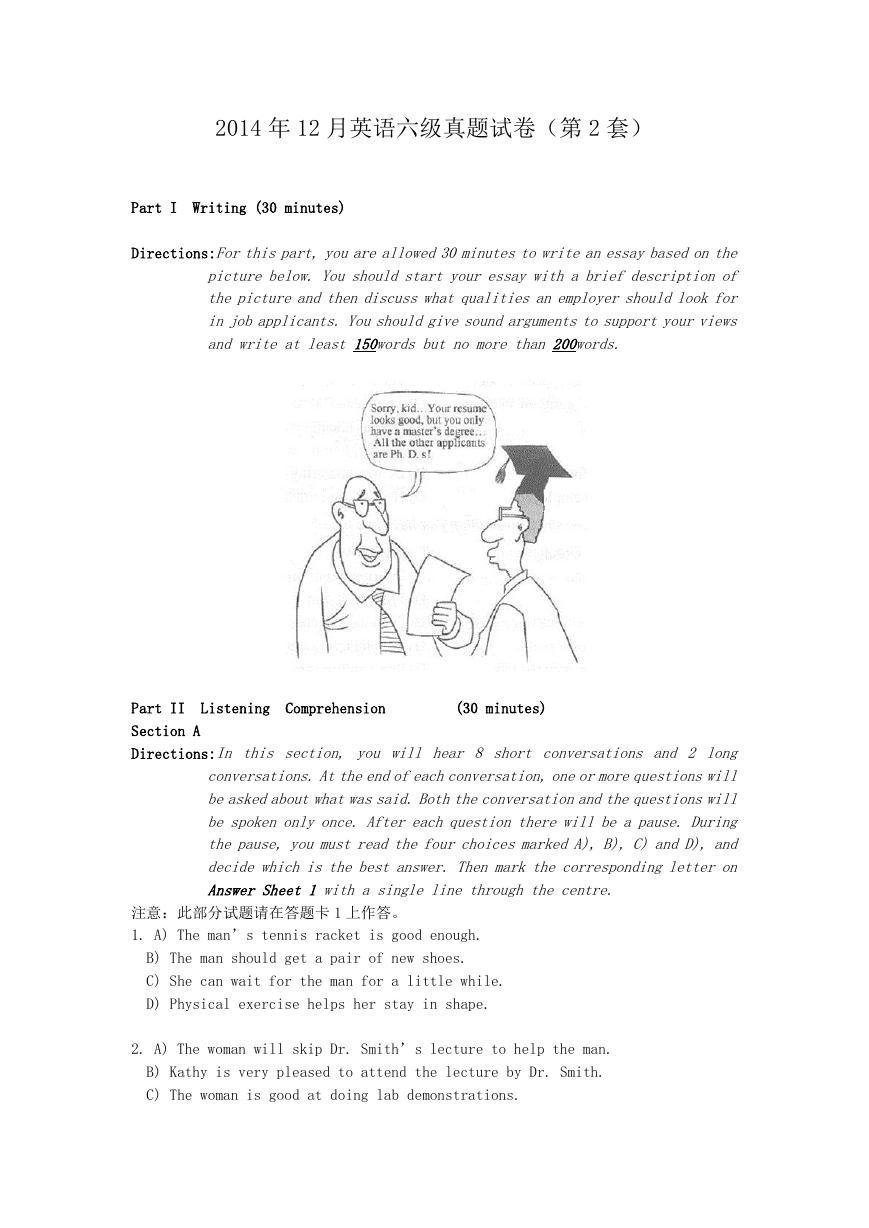
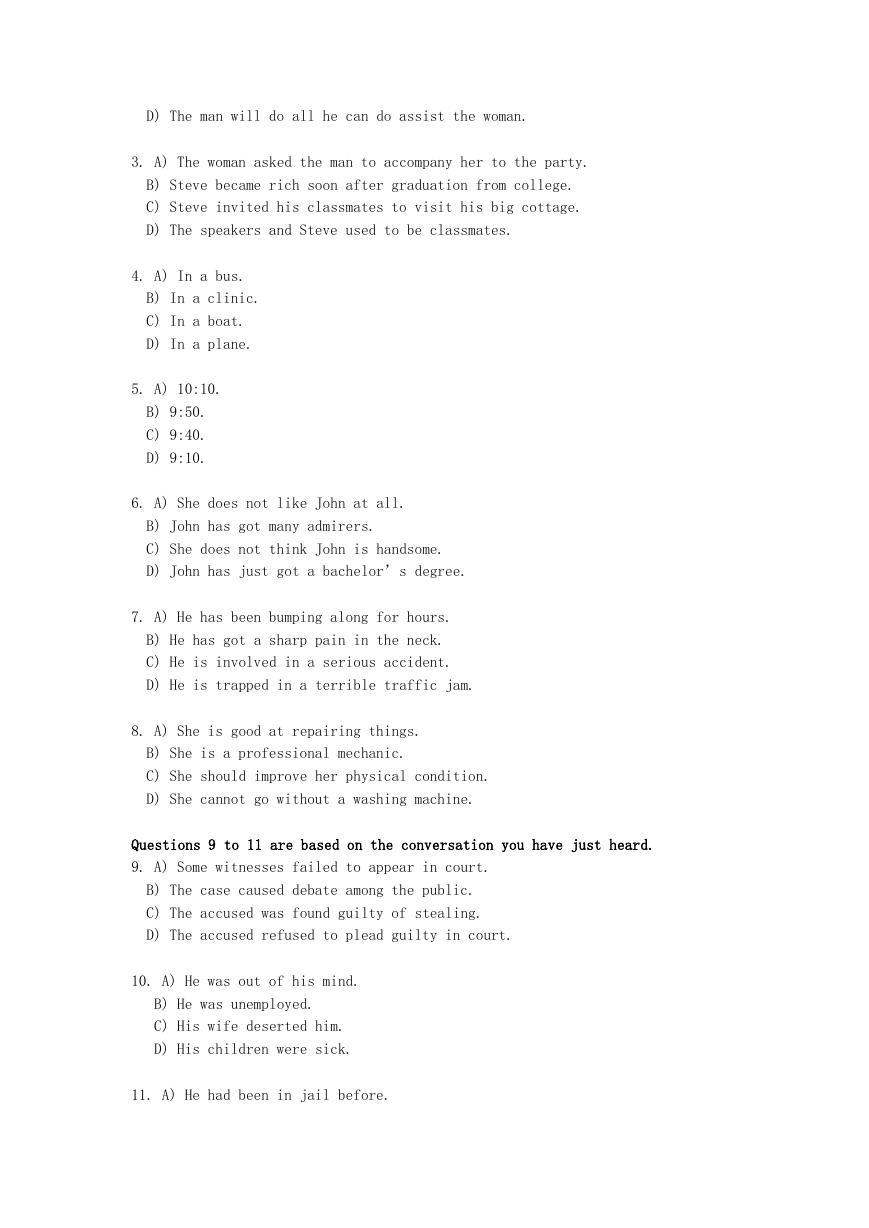

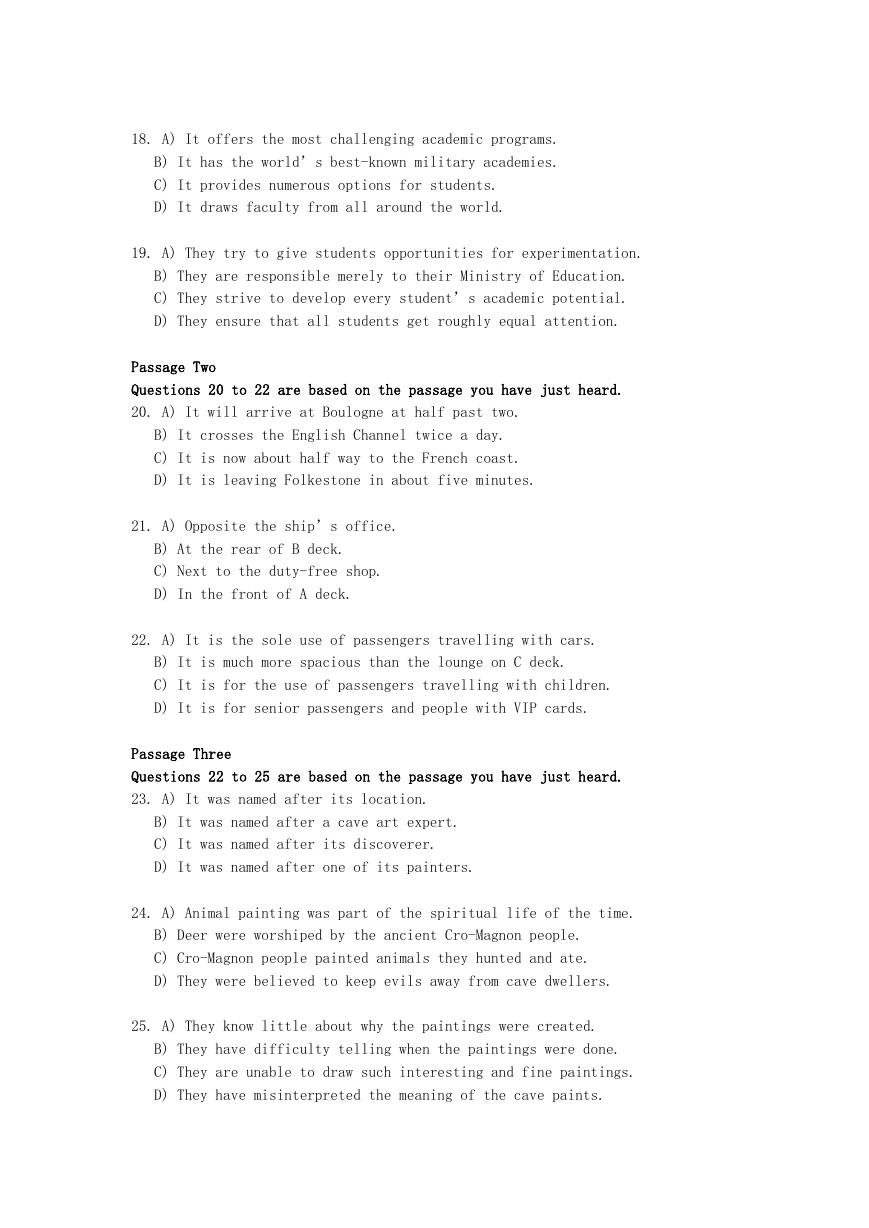
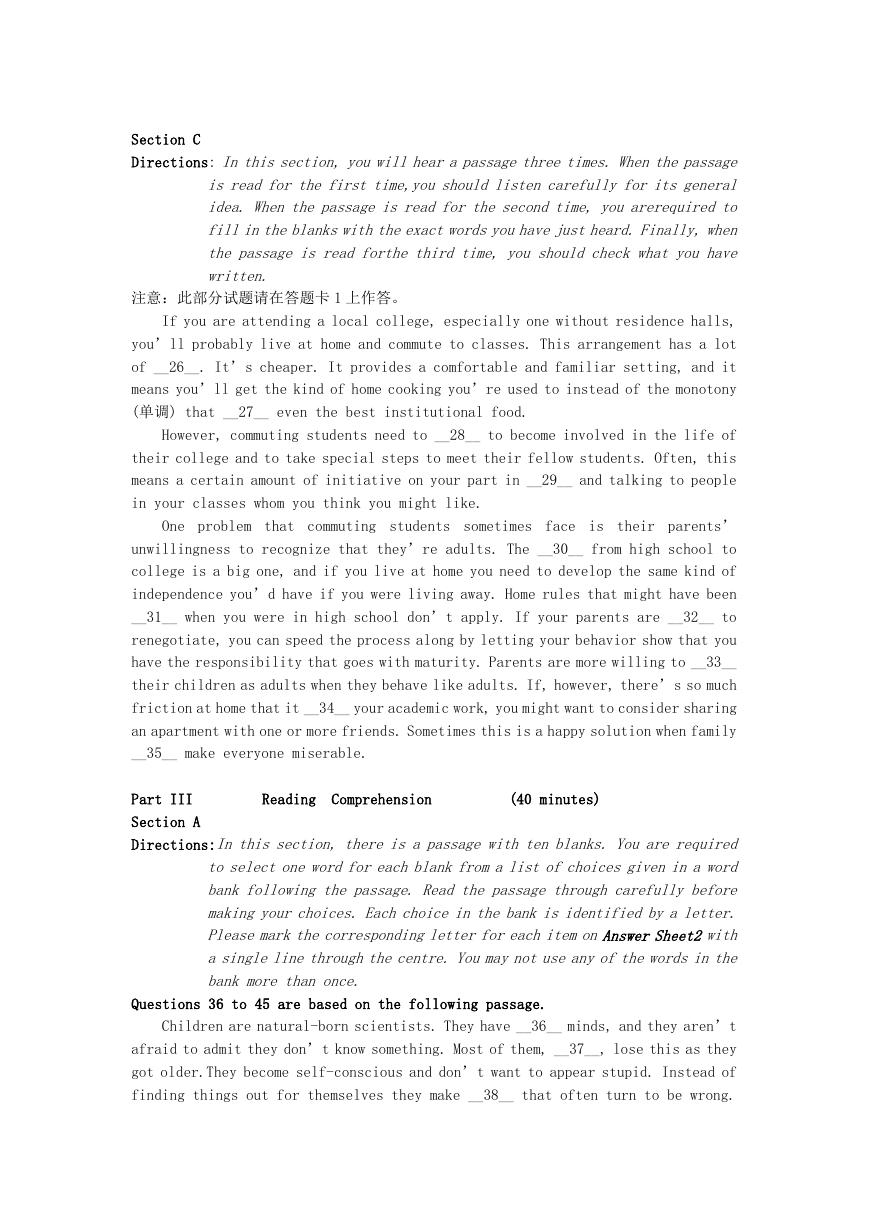
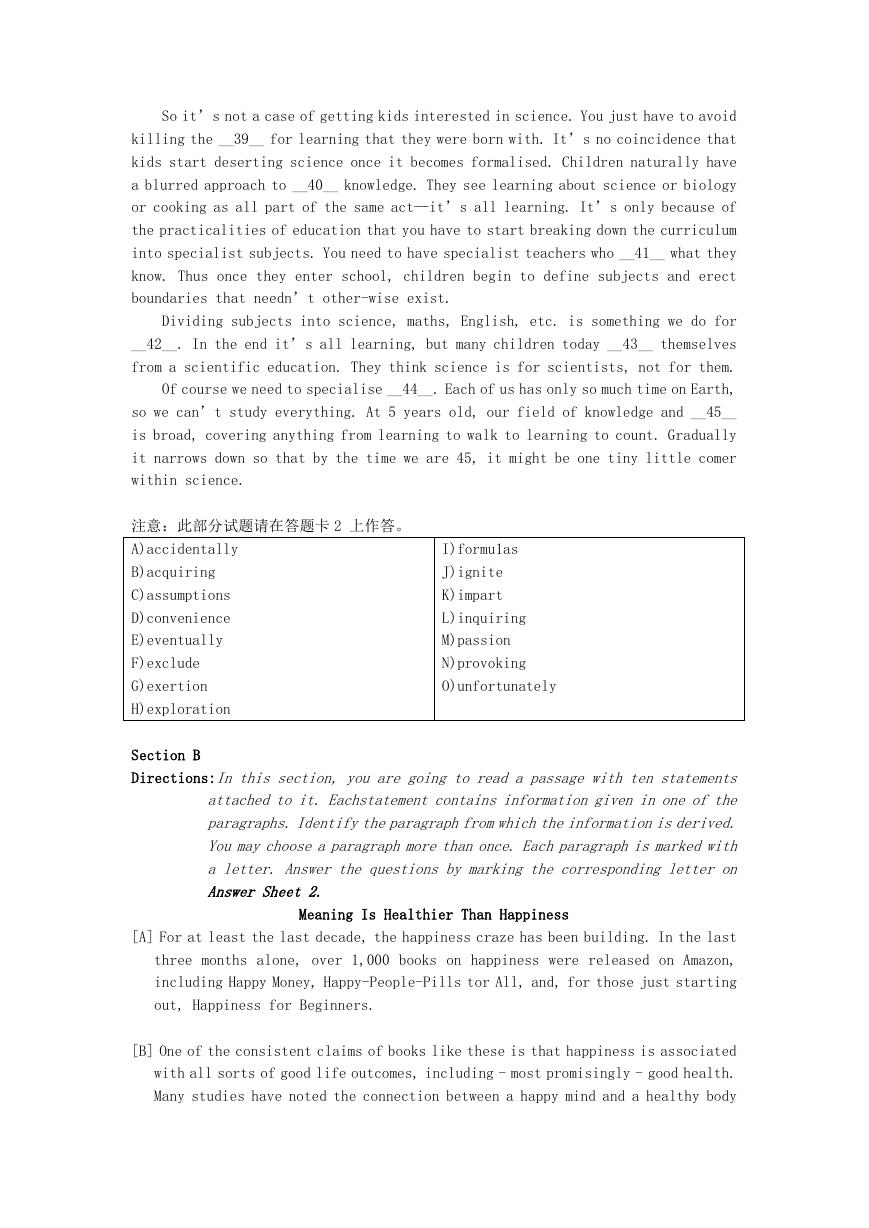
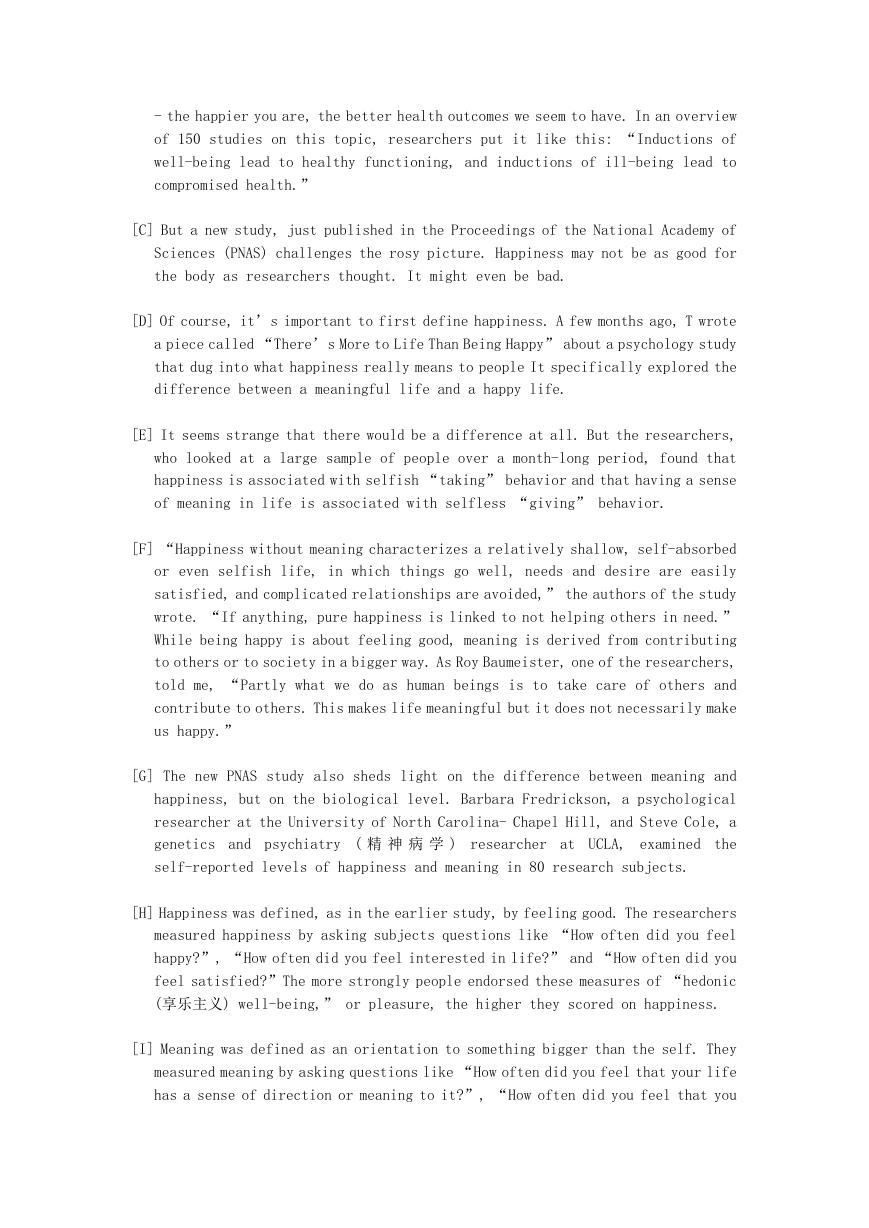
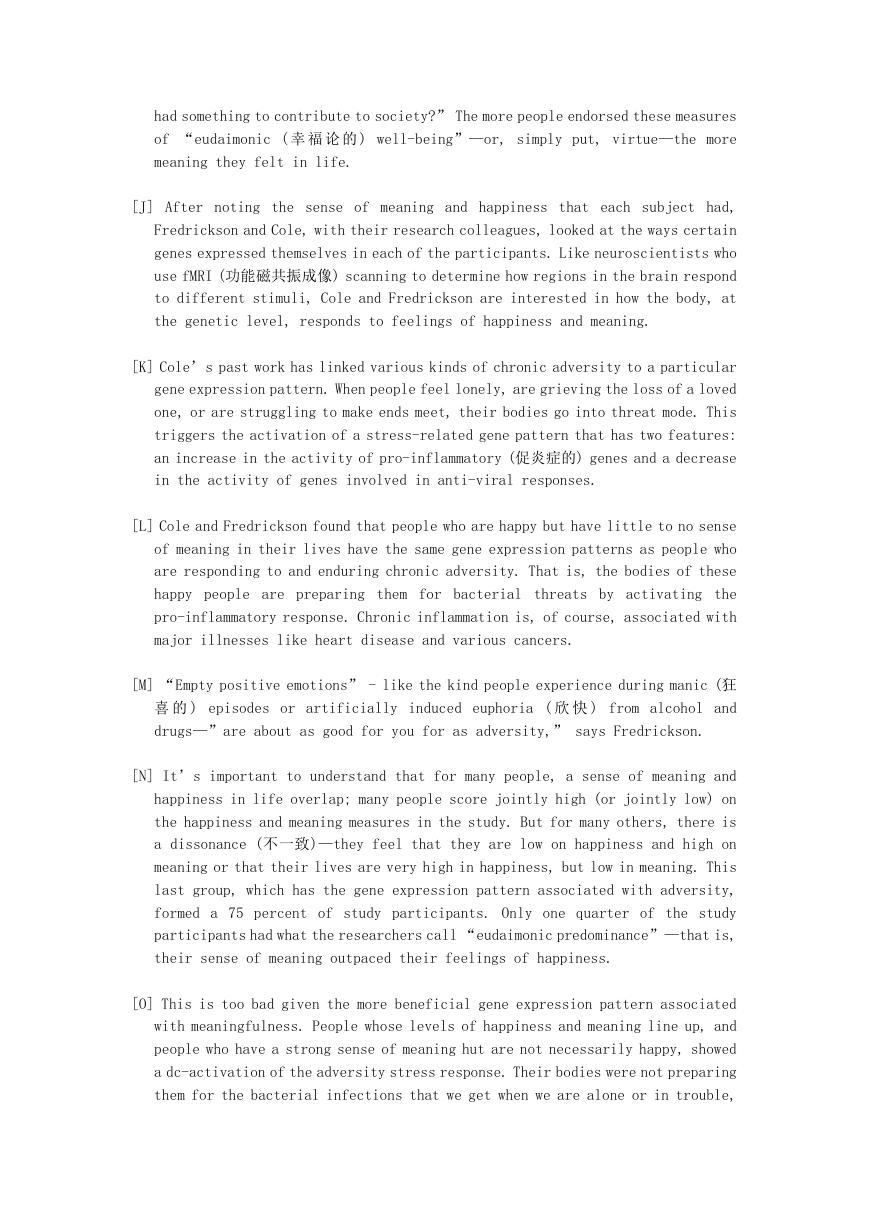








 2023年江西萍乡中考道德与法治真题及答案.doc
2023年江西萍乡中考道德与法治真题及答案.doc 2012年重庆南川中考生物真题及答案.doc
2012年重庆南川中考生物真题及答案.doc 2013年江西师范大学地理学综合及文艺理论基础考研真题.doc
2013年江西师范大学地理学综合及文艺理论基础考研真题.doc 2020年四川甘孜小升初语文真题及答案I卷.doc
2020年四川甘孜小升初语文真题及答案I卷.doc 2020年注册岩土工程师专业基础考试真题及答案.doc
2020年注册岩土工程师专业基础考试真题及答案.doc 2023-2024学年福建省厦门市九年级上学期数学月考试题及答案.doc
2023-2024学年福建省厦门市九年级上学期数学月考试题及答案.doc 2021-2022学年辽宁省沈阳市大东区九年级上学期语文期末试题及答案.doc
2021-2022学年辽宁省沈阳市大东区九年级上学期语文期末试题及答案.doc 2022-2023学年北京东城区初三第一学期物理期末试卷及答案.doc
2022-2023学年北京东城区初三第一学期物理期末试卷及答案.doc 2018上半年江西教师资格初中地理学科知识与教学能力真题及答案.doc
2018上半年江西教师资格初中地理学科知识与教学能力真题及答案.doc 2012年河北国家公务员申论考试真题及答案-省级.doc
2012年河北国家公务员申论考试真题及答案-省级.doc 2020-2021学年江苏省扬州市江都区邵樊片九年级上学期数学第一次质量检测试题及答案.doc
2020-2021学年江苏省扬州市江都区邵樊片九年级上学期数学第一次质量检测试题及答案.doc 2022下半年黑龙江教师资格证中学综合素质真题及答案.doc
2022下半年黑龙江教师资格证中学综合素质真题及答案.doc